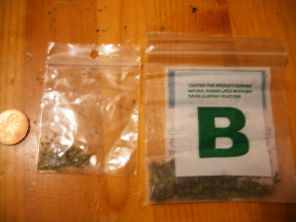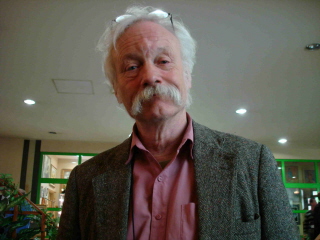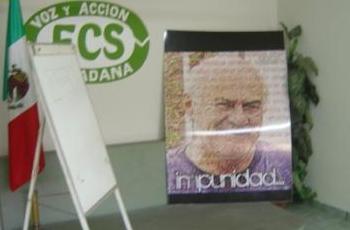For the past three years, a select group of heroin addicts in Vancouver and Montreal have received pharmaceutical grade heroin as part of a pilot heroin maintenance program. Now, the NAOMI program is winding down, the researchers are assembling their reports, and the addicts are back on the streets.
California's Mendocino County has grown rich off of marijuana, but problems have come with the prosperity. Now, everyone is waiting to see whether last week's still undecided election will mean the county takes a step backward from its liberal cultivation laws.
Apply for an internship at DRCNet for this fall (or spring), and you could spend the semester fighting the good fight!
Drug War Chronicle is seeking information on serious police misconduct or misjudgments in the treatment of informants. Confidentiality will be protected.
Another year, another all-time high in US prisoners, and the drug war continues to make a major contribution. This is getting really old.
Busy, busy. Border guards going down, prison guards going down, more cops in trouble, and more investigations of a perjury-condoning prosecutor in Detroit.
The Oregon Court of Appeals has rejected an employer's firing of a medical marijuana patient who did not use on the job, saying it violates state anti-discrimination laws.
Veteran activist Dana Beal of Global Marijuana March fame spent more than a week behind bars in Illinois, arrested on money-laundering charges after police found $150,000 in cash. But he bailed out Thursday after the original charge vanished, to be replaced by an obstruction of justice charge. The cash is still in custody.
The Merida Initiative anti-drug assistance package for Mexico and Central America passed the House this week, but Mexico is balking at human rights and other conditions in the Senate version of the bill. Will the Senate sacrifice human rights on the altar of the drug war?
What may have been the largest drug bust ever took place in Afghanistan this week. But while NATO claimed it dealt a hard blow to the Taliban, profits from the lost hash are miniscule compared to what the group rakes in from the opium trade.
The Argentine government is working on a rewrite of its drug laws, but courts there aren't waiting for the politicians. In April, two federal tribunals in Buenos Aires declared the drug possession laws unconstitutional, and now more courts have followed suit.
A Scottish think-tank tasked by Parliament with figuring out how to reduce drug-related harm has called for marijuana legalization, safe injection sites, and opiate maintenance.
"Will John McCain Avoid Running a 'Tough-On-Crime' Campaign?," "World Record Marijuana Crop Gets Blown Up By Fighter Jets," "Two More Horrible Drug Raid Disasters," "Bob Barr's Newfound Drug War Opposition Shows That Anything is Possible," "Vietnam Orders Police to Win the Drug War by August," "Stop Making Excuses and Go Watch 'The Wire'," "People are Getting Themselves Arrested Just So They Can Sell Drugs in Jail," "The Drug War is a War on Communities of Color," "George Bush and Cocaine: How the President Might Save His Approval Rating."
Events and quotes of note from this week's drug policy events of years past.
Do you read Drug War Chronicle? If so, we need your feedback to evaluate our work and make the case for Drug War Chronicle to funders. We need donations too.
Support the cause by featuring automatically-updating Drug War Chronicle and other DRCNet content links on your web site!
A new way for you to receive DRCNet articles -- Drug War Chronicle and more -- is now available.
Visit our new web site each day to see a running countdown to the events coming up the soonest, and more.
Every day for 15 months, Vancouver heroin addict Rob Scott Vincent, 36, went into a nondescript building on the city's Downtown Eastside where a nurse would hand him a syringe loaded with pharmaceutical grade heroin. Sitting at a sterile, stainless steel counter, Vincent would inject himself with the drug, then sit in an equally sterile waiting room for awhile as the drug took hold before heading out to do his daily business.

Hastings Street, on Vancouver's East Side (courtesy VANDU)
Vincent was one of 251 participants -- 192 in Vancouver and the rest in Montreal -- in the only heroin maintenance program in the hemisphere, a pilot program known as the
North American Opiate Maintenance Initiative (NAOMI). Originally intended to operate in both Canada and the US, the US component never got off the ground in the drug war atmosphere there. And now, NAOMI is winding down in Vancouver and Montreal. The last handful of participants in the program will get their last fixes at the end of this month.
In the program, which was limited to long-time addicts over 25 who had failed to kick the habit at least twice in previous treatment tries, participants used treatments of oral methadone or injected heroin. A small percentage received a pharmaceutical opiate called Dilaudid. Participants also received counseling and other support services. The Canadian federal government (then under control of the Liberals) funded the project with $1.8 million and agreed to allow the importation of pharmaceutical heroin for the project.
Similar pilot opiate maintenance projects in Switzerland, Germany and the Netherlands produced results showing reductions in criminality, drug use, and economic costs to society, and increases in health, stability, and employability among participants. NAOMI researchers and supporters are hoping it will produce similar results. While the final research report from NAOMI is not expected until the fall, preliminary results suggest the findings will be similar to those in Europe.
In a March briefing paper, NAOMI reported that 85% of participants taking injected heroin had stayed with the program for 12 months, that the treatment had proven to be "extremely safe," and that there had been no security issues or evidence that NAOMI had had a deleterious impact on the neighborhood. The paper also suggested that the program would show a positive economic impact.
Canada estimates that each heroin addict costs the country $45,000 a year. The studies of European opiate maintenance programs report that they save host countries $20,000 a year for each participant.
"What we know now is that we were able to recruit people with long-term dependence on heroin who repeatedly failed other treatments and who had many health and social problems when they entered," said Dr. David Marsh, one of the co-investigators and lead clinical physician for the study. "From a doctor's perspective, whether they were treated with methadone or heroin, many of them improved dramatically. We'll know from the formal research results how much and in what ways they improved."
The provision of methadone or heroin was only part of the treatment, Marsh said. "The medication is a component of a broader package of primary care, mental health care, addiction counseling, and case management to provide participants with access to a range of welfare and other benefits," said Marsh. "We work with people to try to manage the negative consequences of their drug use and help them improve their lives."
Vincent had been addicted to opiates for nearly 15 years when he decided to participate in NAOMI. "I wanted to see if it could better my life, and it did," he said. "It helped me slowly wean down. I'm still using, but not even one-third of what I was using."
Vincent's stint in NAOMI ended in March. Since then, he has had to return to the streets to find his drugs. "It's not too bad," he said. "I mostly use morphine pills, and I pick up a pill for $5 bucks every morning and I'm good for the day." Vincent pays for his fixes by collecting and recycling cans. But sometimes, he can't find what he wants and has to spend time searching for a substitute opiate -- heroin, dilaudid, whatever is around. "It's usually readily available," he said, "but sometimes I have to scrounge around."
Getting participants completely off opiates wasn't the be-all and end-all of the pilot program, said Marsh. "Patients benefit in a lot of ways," he said. "Some were able to stop taking illegal opiates, and in my view, if a patient is prescribed methadone and is using it properly, I consider that a success. Methadone treatment has been available for many years, and there are thousands of studies showing its benefits."
The Vancouver Area Network of Drug Users (VANDU) was one of the key supporters of NAOMI, despite its complaints about the restrictiveness of the standards for qualifying for the study. The program needs to continue, VANDU said.
"Regardless of the parameters they set that made it tough to qualify, this is a badly needed service and it's a shame it's just a pilot project and is not continuing," said VANDU president Richard Utendale. "I've talked to a lot of people who have been helped by it. They were able to improve their day-to-day lives by not having to struggle to feed their drug habits. NAOMI provided a safe place and support, and participants didn't have to worry about being jacked up by the police or ripped off or sold inferior products or dope with adulterants."
The Downtown Eastside, where both VANDU and NAOMI are located is the epicenter of one of the largest hard drug scenes in the hemisphere. The program had an impact on the area, said Utendale. "I think NAOMI also improved the neighborhood, with less street and property crime."
There was a downside to NAOMI, though, said Utendale. "The drawback is that when people are finished with the program, they have to go back on the street and resort to the same old means of getting their drugs. That's why this needs to be permanent."
Vincent said he wished the program could continue. "I would most definitely participate in a permanent program," he said. "It was very, very helpful. It's a lot easier to quit or reduce my intake with pharmaceutical grade heroin. Most of the stuff on the street is cut with other things -- that's why I like to use morphine. I can't see any reason for not keeping this open," he said. "NAOMI is a medical facility, just like Insite [the Vancouver safe injection site]. They should not shut it down."
But that is what is going to happen at the end of this month. Last November, doctors appealed on compassionate grounds to extend the program on behalf of five participants. So far there has been no agreement from either Health Canada or the regional health authority.
"Dreams are free," Utendale sighed, "but the way things are looking right now, this isn't going forward without some changes in Ottawa."
Marsh said it was "premature" to try to predict what would happen. "But I'm optimistic we'll find funding and get the regulatory approval at some point to apply the lessons we've learned from this study," he said.
But given the current Conservative federal government's ideological opposition to harm reduction, as evidenced by its losing battle to shut down Vancouver's safe injection site, it is going to take a new national election before there is any chance that Canada will follow the Europeans' lead and make heroin maintenance part of a broader public health policy.
back to top
Eight years ago, voters in Northern California's Mendocino County passed the groundbreaking Measure G, which allowed people to grow up to 25 marijuana plants for medical or personal use and directed local law enforcement authorities to make marijuana offenses their lowest enforcement priority. Since then, the already well-established Mendocino cultivation community has exploded, and with the size of the crop estimated to be somewhere between $500 million and $1.6 billion a year, marijuana is now the backbone of the local economy.

outdoor marijuana harvest in California (from NDIC via usdoj.gov)
But with the boom have come problems, and now the backlash. Some of it is purely ingrained cultural opposition to marijuana, but other Mendocino residents have complained of environmental damage from commercial grows, diversion of water supplies, trash in the forests, neighboring backyards with valuable crops that attract thieves and armed robbers, the smell of growing marijuana wafting into schools and homes, and the disturbing of rural tranquility by pot-enriched ne'er-do-wells roaring around back roads in their high-dollar SUVs.
Last week, Mendocino residents went to the polls to vote on a measure that would undo Measure G and set cultivation limits at six plants, as mandated by state law. (That portion of the law was recently declared unconstitutional by a state appeals court; see our coverage here.) Known as Measure B, the initiative had the support of most of the county Board of Supervisors and the rest of the political establishment and prominent local media, and polling suggested it would easily pass.
But despite media reports on election night that the measure had passed by a margin of 52% to 48%, the election is by no means over. Nearly 11,000 hand-delivered absentee ballots, or about 38% of the total vote, have not yet been counted. The county has until the end of the month to count them and certify the election, although the final results could be announced any day.
Opponents of Measure B think that they will prevail when all the votes are counted. Supporters of Measure B say the same.
"The margin right now is only 710 votes, and we think we will win in the end," said Laura Hamburg, spokesperson for the insurgent movement to defeat the initiative known as the No on Measure B Coalition.
"One reason for optimism is that those last minute ballots are coming from people who were very concerned about making sure the registrar got their votes, and we have been stirring those people to get out and vote. The second reason is geography. The county seat of Ukiah is more conservative, but the outlying areas of the county have been much more liberal and sympathetic to mom and pop personal and medical use. These rural areas are where the hand-delivered absentee ballots are coming from."
"There are a lot of conservative voters who take voting seriously and don't trust the Post Office and want to hand deliver their votes," argued Ross Liberty, spokesman for Yes on Mendocino County Measure B Coalition. "And our strongest district is District 1, which is where most of the uncounted votes are coming from. This is still doable," he said, while conceding that some of his allies consider his prediction of a 60%-40% win "overly optimistic." Still, said Liberty, his team all agrees they are odds on favorites to win.

Dale Gieringer (courtesy pot-tv.net)
"No matter what the final outcome, this is a moral victory for us," said Dale Gieringer, executive director of
California NORML, which opposes Measure B. "We were opposed by the board of supervisors, city councils, the sheriff, the DA, the monied civic groups, and the leading local media. We had the deck stacked against us, we were supposed to lose, but this has turned into a really close contest," he said.
Liberty said he was not opposed to medical marijuana or even recreational marijuana use, but that the situation in Mendocino County was intolerable. "I'm a libertarian," he said. "I would think I'd died and gone to heaven if federal marijuana prohibition were lifted, but I don't want Mendocino to be the only place doing it. These people aren't growing despite it being illegal, but because it's illegal. They're growing and dealing because its illegal and has a federal price support program."
Liberty said he was not personally impacted by marijuana growing -- although he complained about "the trained helplessness that dependence on federal marijuana prohibition brings to our community" -- but that other supporters of repeal were. "People who live near me grow, and it doesn't bother me, but there are quite a few people who can't stand the smell of it -- it really reeks in the summer -- and it can make their lives miserable," he said.
"It's also dangerous because it's worth so much money," Liberty continued. "One lady I know, within a hundred yards of her house, there's collectively a million-dollar marijuana crop in her neighbors' back yards. You have people with guns going through yards just following their noses looking for marijuana to steal. How do you let you kids out to play when that's going on?"
Liberty mentioned yet another problem, too. "I've had people grow on my property without my permission," he said. "It's not medical marijuana, it's just dope growers and outlaws." But, Liberty said, that incident predated Prop. 215.
Measure B doesn't address the real problems created by commercial growing, said opponents. "This initiative isn't aimed at the problems created by the large commercial grows -- the growing on public land, the environmental damage -- but at the people growing fewer than 25 plants," said Gieringer. "They're cracking down on the small growers, not the commercial growers. With even our opponents conceding it shouldn't be illegal, we should be about dealing with the problems associated with those big grows, and Measure B doesn't do that," he said.
"We've seen an increase in criminal profiteering with commercial grows and growing on federal land, so there was a backlash from that," Hamburg acknowledged. "People started feeling like the energy was different, they saw all this profiteering. We're in our fourth decade of marijuana farming here, and we do it well, it is one of the glues that holds this county together, but there had never been any public venting of tensions about these changes," she said. "People wanted to DO SOMETHING, and many of them initially supported Measure B, but that has been changing as they really think about what it means," she said.
"This measure targets the wrong people," argued Hamburg. "If you want to address marijuana, why turn on the community? Why don't we see instead how we can thwart those big commercial grows? Mom and pop growers are community-minded people; if they are compensated by the dispensaries, they report their income. They're proud of being organic gardeners. We think we should put resources and energy into fighting crime, not backyard grows, and that's what's been happening."
Indeed, with the election of a new sheriff and district attorney in late 2006, marijuana law enforcement has come down harder, and asset forfeiture numbers are rising through the roof -- up from $100,000 in 2005 to $1.6 million last year -- but it's not the illegal large national forest grows being targeted, said Hamburg.
"When the sheriff goes after those big commercial grows, all they typically find is some guys living in tents in the woods -- there are no assets to seize," she noted. "We're very concerned that they are targeting smaller growers. Don't turn on law-abiding citizens who are part of the fabric of this community," she pleaded. "Don't turn us into criminals. We don't want to be felons for growing one plant for personal use or seven for medical."
It wouldn't just be mass criminalization that Mendocino would have to worry about if Measure B passes, it could be economic recession. Marijuana is by far the most important economic activity in the county, and Liberty freely admits that victory could lead to hard times, or, as he put it, "a period of adjustment."
"To the extent that we move the needle, we will have to adjust from an economy dependent on federal prohibition to one that is driven by the free market," he said. "Now, you don't see regular jobs coexisting with this marijuana economy. Basic industry jobs that must be globally competitive cannot compete with the wages driven by the price support program we know as federal prohibition."
Whatever the final election result, the Mendocino marijuana wars are far from over. And proponents of a more open system of regulated growth and sales are feeling emboldened. "After we came back in this campaign, we have a lot of bargaining strength," said Gieringer. "We expect to make some really forward-looking proposals for regulating the industry in Mendocino and moving closer to a legally regulated market that makes money for the county and keeps the criminals and fringe element at bay."
Stay tuned.
back to top
Want to help end the "war on drugs," while earning college credit too? Apply for a DRCNet internship for this fall semester (or spring) and you could come join the team and help us fight the fight!
DRCNet (also known as "Stop the Drug War") has a strong record of providing substantive work experience to our interns -- you won't spend the summer doing filing or running errands, you will play an integral role in one or more of our exciting programs. Options for work you can do with us include coalition outreach as part of the campaign to repeal the drug provision of the Higher Education Act, and to expand that effort to encompass other bad drug laws like the similar provisions in welfare and public housing law; blogosphere/web outreach; media research and outreach; web site work (research, writing, technical); possibly other areas. If you are chosen for an internship, we will strive to match your interests and abilities to whichever area is the best fit for you.
While our internships are unpaid, we will reimburse you for metro fare, and DRCNet is a fun and rewarding place to work. To apply, please send your resume to David Guard at [email protected], and feel free to contact us at (202) 293-8340. We hope to hear from you! Check out our web site at http://stopthedrugwar.org to learn more about our organization.
back to top
Many of our readers know about the tragic case of Rachel Hoffman, a 23-year-old in Tallahassee, Florida, who was killed by drug dealers after police coerced her into acting as an informant without having access to an attorney. Drug War Chronicle is currently looking for cases, reported or unreported, in which police appear to have committed misconduct or made serious misjudgments in their treatment of informants.
If you can help us find such cases, please email David Borden at [email protected]. We will keep your name and personal information confidential unless you tell us otherwise. If you are uncomfortable sending this information by email, feel free to contact us by phone instead; our office number is (202) 293-8340, and you can speak or leave a message with David Borden or David Guard. Thank you in advance for your help.
Further information on the informant issue, including the Rachel Hoffman case, can be found in our category archive here.
back to top
Every year, the US Justice Department's Bureau of Justice Statistics releases its annual reports on Prison Inmates at Midyear and Jail Inmates at Midyear, and every year we write basically the same headline. The midyear 2007 reports, released last Friday afternoon, are no exception: Once again, the number of people behind bars in the United States is at an all-time high. And although the reports do not break down the offenses for which inmates are incarcerated, according to other recent BJS reports, drug law violators continue to account for roughly one-quarter of the US jail and prison population.
According to the reports, local jails held 780,581 inmates and state federal prisons held another 1,518,535, for a total of just under 2.3 million prisoners in America on June 29, 2007. On a per capita basis, that is 762 prisoners per 100,000 US residents, up from 648 per 100,000 in 2000. The US continues to maintain its position as the world's leading jailer, in both actual numbers and per capita.
And black men continue to be overrepresented in the prison figures. Blacks make up about 13% of the US population, but 35.5% of all prisoners, BJS reported. Nearly one out of 20 (4.6%) of black males were behind bars, a rate more than double that of Hispanic men (1.7%) and more than six times that of white men (0.7%).
While the perpetual upward trend in prisoners continued, the rate of growth slowed slightly last year. In the first six months of 2007, the number of jail and prison inmates climbed 1.6%, compared to 2.0% for the same period in 2006. The slowing in prison population growth was due largely to slower growth in the 10 states with the largest number of prisoners in 2000 -- Texas, California, Florida, New York, Michigan, Ohio, Illinois, Georgia, Pennsylvania, and Louisiana. Growth in those 10 states was 0.7% in 2007, down from 2.3% the previous year.
Growth in jail populations also slowed, from 2.5% in 2006 to 1.9% in 2007. This was the smallest annual rate of growth in the jail population since 2001 and the second smallest since 1981. Still, 13 million people were sent to jails in 2007, BJS reported.
Sentencing reforms adopted by some states in the past decade may be partly responsible for the slight slowing in the growth of the incarceration behemoth, but with the drug war percolating right along the overall trend remains upward. It is difficult to stop a freight train on a dime, let alone throw it into reverse.
back to top
Busy, busy. Border guards going down, prison guards going down, more cops in trouble, and more investigations of a perjury-condoning prosecutor in Detroit. Let's get to it:
In San Diego, a US Customs and Border Protection officer was indicted by a federal grand jury June 3 for allegedly taking $200,000 in bribes to let illegal immigrants and marijuana into the country. Luis Francisco Alarid, 31, is charged with conspiracy to smuggle more than 100 kilograms of marijuana, conspiracy to transport illegal immigrants and bribery. In March, Alarid permitted a car driven by his uncle with 18 illegal immigrants and 170 pounds of marijuana to enter the United States, according to authorities. On May 3, Alarid allowed a caravan of four vehicles carrying illegal immigrants into the country. He faces up to 90 years in prison if convicted.
In McAllen, Texas, a US Border Patrol agent was arrested Monday and accused of smuggling 11 bricks of cocaine into the country. Agent Reynaldo Zuniga, 34, faces charges of conspiracy to distribute cocaine. Zuniga allegedly picked up a Mexican drug courier at the border and drove him to meet another man in Hidalgo. Those two are also under arrest. One of them said Zuniga had helped smuggle drugs or illegal immigrants at least six times.
In Texarkana, Arkansas, a Miller County prison guard was arrested May 30 after trying to smuggle syringes into the jail inside tacos and marijuana hidden inside a container of chili. Guard Jordan Michael Waller, 25, went down after a supervisor became suspicious and searched the food. A search of Waller himself also turned up tobacco, methamphetamine, and more drug paraphernalia. He is charged with possession of a controlled substance with intent to deliver, possession of drug paraphernalia, and furnishing prohibited items inside a correctional facility. He goes to court June 17.
In Andalusia, Kentucky, an Andalusia police officer was arrested June 4 on drug distribution charges. Officer Joshua Chad Wood was arrested at a local motel by members of the Covington County Drug Task Force as he tried to illegally sell legally obtained prescription pills to undercover agents. He is charged with drug distribution, complicity for not reporting the presence of marijuana, and violation of state prostitution statutes. He has been suspended without pay pending a termination hearing.
In Farmington, Missouri, a former state prison guard was sentenced last Friday to seven years in prison on drugs and weapons charges. Seth Barton, who had worked at the Bonne Terre state prison, went down after prison employees searched his vehicle on prison property in February 2006. They found bags of marijuana, a loaded handgun, ammunition, a hunting knife, a jar of marijuana seeds, drug paraphernalia and more than $1,500 in cash. He pleaded no contest in April to charges of felony drug possession with intent to distribute and delivery of a weapon at a prison.
In Indianapolis, a former Indianapolis police officer was sentenced June 4 to three years probation for providing information to drug suspects to help them avoid arrest. Former Officer Noble Duke, 39, pleaded guilty in April to unlawfully disclosing the contents of federally authorized wiretaps with the intent to obstruct or impede a criminal investigation. Duke was monitoring phone conversations in a wiretap case and was aware of another case being monitored in the same room at the Indianapolis FBI office. Duke relayed information about phones being tapped, pending indictments, and the date raids were scheduled. He also has to do four months community confinement and six months of house arrest.
In Detroit, the Michigan Attorney General's Office is taking over the investigation of Wayne County's lead drug prosecutor, who is accused knowingly using perjured testimony in a 2005 cocaine case. Assistant Prosecutor Karen Plants was suspended in April after the Michigan Attorney Grievance Commission charged her with misconduct for allowing an informant and two Inkster police officers to lie under oath during a cocaine conspiracy trial. Wayne County Prosecutor Kym Worthy asked that another agency investigate Plants, and the Attorney General's Office stepped in after prosecutors in four nearby counties declined to get involved.
back to top
Oregon employers must make a reasonable accommodation for workers who use medical marijuana for a disability, the Oregon Court of Appeals ruled in an opinion released Wednesday. The ruling upheld an earlier ruling by the state Bureau of Labor and Industries that found that state laws barring discrimination protected medical marijuana users from being fired because of their choice of medications.

medical marijuana bags (picture courtesy Daniel Argo via Wikimedia)
The decision came in the case of Emerald Steel Fabricators, Inc., in which an employee was terminated after admitting he had a doctor's recommendation to use marijuana. A key factor in the court's decision was the fact that the employee did not use marijuana at work. In a 2006 ruling, the state Supreme Court upheld the firing of a worker after he tested positive for marijuana, but in that case, the high court avoided the issue of non-workplace use of medical marijuana.
The voter-approved 1998 Oregon Medical Marijuana Act was unclear on whether employees must accommodate workers who use medical marijuana away from the workplace. In the present case, the Oregon Court of Appeals emphasized that the Emerald Steel employee did not use marijuana at work.
The appeals court also rejected several arguments by Emerald Steel, including the claim that employees could be affected on the job by off-hours medical marijuana use and the claim that marijuana use violates federal law even if it is legal under state law. Emerald Steel had not raised those issues during earlier proceedings. "Accordingly, we will not consider those issues for the first time on review," wrote Judge Timothy Sercombe in the opinion.
Legislators and some employer lobbies in Oregon have been trying for the past several years to impose restrictions on medical marijuana use and for laws that would allow employers to fire workers who use medical marijuana. But so far, those efforts have gone nowhere. Now, the Oregon Court of Appeals has dealt another blow to those efforts.
back to top
Dana Beal, a permanent fixture on the counterculture scene and a veteran New York City-based activist perhaps best known for organizing the annual Global Marijuana Marches and smoke-ins for the past 30 years, was arrested last week in Illinois on money-laundering charges. But at a court hearing Thursday, the original charge was abandoned and Beal was charged with the much lesser offense of obstruction of justice. He was able to make the $7,500 cash bond set at that hearing and is now a free man, at least for now.

Dana Beal
According to the
New York Times, which cited local law enforcement officials, Beal was arrested after officers from the Mattoon Police Department arrived at a local restaurant on June 3 upon receiving a report of two women creating a disturbance inside. (A private source told Drug War Chronicle it was a daughter helping her disabled mother, who had become flustered with a physical situation.) The two women were traveling with two men, one of whom was Beal. Witnesses told police they saw Beal, who was in a van outside the restaurant, placing bags beneath nearby vehicles. When police opened the bags, they found more than $150,000 cash. They then brought in drug-sniffing dogs, who alerted on the cash.
"They're saying the money smelled like marijuana," Beal's local attorney told the Times.
The Times reported that Beal had told friends he was traveling with the cash because he was planning to finance an ibogaine clinic with it. Beal is a long-time advocate for ibogaine, which he and others argue can be used to break addictions to other drugs.
Although Beal was originally charged with money-laundering, local prosecutors may have figured out that a US Supreme Court ruling last week cut the legs out from under them. In that case, Regalado Cuellar v. US, the high court ruled that merely hiding money in a vehicle does not constitute money laundering. Instead, prosecutors must show that the money was hidden with the purpose of hiding the true source of the funds. Illinois prosecutors said they may try to file money-laundering charges later, but that will require more evidence than merely hiding money.
Still, Beal is currently facing charges and his money is now in the hands of Illinois authorities. Whether he can keep his freedom -- or get the cash back -- remains to be seen.
At least two web sites, Steve Bloom's Celeb Stoner and the Weird Load: Only in America blog are providing frequent updates on Beal's ordeal. The latter features a jailhouse interview with him.
(Drug War Chronicle will publish information on Beal's legal defense fund when it becomes available.)
back to top
The US House of Representatives Tuesday approved a $1.6 billion, three-year anti-drug assistance plan aimed at helping Mexico and Central American countries fight the region's powerful drug trafficking organizations, but the package is now in doubt after the Mexican government voiced strong objections to provisions in the Senate version of the bill that tie the aid to human rights measures. The version of the bill in the Senate has yet to be approved.

poster of assassinated human rights advocate Ricardo Murillo (photo by Chronicle editor Phil Smith)
The vote came amidst rising levels of prohibition-related violence in Mexico. Some 4,000 people -- including more than 450 police and soldiers -- have been killed in the drug war since President Felipe Calderón escalated it at the beginning of last year by sending some 25,000 troops and federal police into drug trafficker strongholds. The traffickers have taken time off from fighting among themselves to strike back at government forces, recently assassinating several top federal and municipal police commanders. Last week, traffickers in Culiacán ambushed and killed eight police in one day.
The bill, passed by the House 311-106, would begin to implement the Mérida Initiative, named after the Mexican city where US and Mexican officials sat down last year to hammer out an assistance package. Under that plan, the US funds would go for equipping and training security forces in Mexico and Central America and for improving justice systems in the region. Mexico would get $1.1 billion, while Central American and Caribbean countries would get roughly $400 million. Another $74 million would go to trying to slow the flow of illicit weapons from the US to Mexico.
But while Mexico had been eager to win the aid package, it is balking at the conditions in the Senate bill, which include human rights reviews, judicial reforms, and other issues. The conditions mark a return to "certification," where the US unilaterally determined whether nations where complying with US drug objectives, complained Mexican assistant attorney general for international affairs José Luis Santiago Vasconcelos.

RÃodoce (newspaper) cover -- Sinaloa keeps bleeding. Why more (soldiers)?
"Why don't we tell the Americans to use those [funds] for their own interdiction forces or interception forces... and stop the flow of weapons," Santiago Vasconcelos said in a radio interview cited by the
Dallas Morning News. "Rather than giving them to Mexico, they can be used by the Americans to reinforce their Customs service, their Border Patrol, and stop the arms trafficking to our country."
Mexican Attorney General Eduardo Medina Mora said last week that President Calderón is waiting to see the final version of the bill before making a decision. "The president will very carefully consider what is finally approved, and defending the best interests of Mexico, will make the correct decision, of that we can be sure," he said.
"I think one way or another, it's dead," political commentator Ricardo Alemán told the Morning News. "Mr. Vasconcelos is a very high-ranking police official and has support from the government," Alemán said, adding that Mexican pride is at stake. "Mexicans are very unyielding on this," he said. "First you reduce the amount, and then you put on conditions, so why don't you just keep your money."
A delegation of US senators flew last weekend to Monterrey, Mexico, to meet with Mexican officials in an effort to assuage their concerns, and there are signs they will seek to remove the offensive language from the Senate bill.
"We heard from everyone here the common message that this language has got to be changed," said Sen. Chris Dodd (D-CT), one of 11 US legislators attending the two-day meeting. "Our friends in Mexico needed to vent and explain how this issue was not handled well," the senator added. "Anything that smacks of certification is a nonstarter."
Now it's time to see if the US Senate will sacrifice Mexican human rights on the altar of the drug war.
back to top
Afghan police found and destroyed a whopping 260 tons of hashish near Spin Boldak in Kandahar province near the Pakistan border Monday. The contraband cannabis was buried in trenches and bunkers in the desert, and the stash was so extensive that NATO called in two aircraft to bomb it. Also found was five tons of opium.

hidden drug cache, Afghanistan 2008 (from nato.int)
In a
Wednesday press release, NATO's International Security Assistance Force (ISAF) claimed to have struck a major blow against the Taliban, which is strong in Kandahar and widely thought to profit handsomely -- along with many other actors -- from the Afghan drug trade.
"With this single find, the police have seriously crippled the Taliban's ability to purchase weapons that threaten the safety and security of the Afghan people and the region," said General David McKiernan, commander of ISAF, the International Security Assistance Force.
The hash had an estimated regional wholesale value of $400 million. ISAF officials estimated that the Taliban would have pocketed about $14 million from the sale of the drugs. But despite McKiernan's claim, that's chump change compared to the hundreds of millions of dollars the Taliban is estimated to make each year from the opium trade.

burning of hash cache, Afghanistan 2008 (from nato.int)
The seizure of such a massive quantity of hashish should also raise questions about the Afghan government's overall anti-drug program. While Afghan and Western officials praised Afghanistan for eradicating opium production in some northern provinces last year, it appears farmers there simply switched over to cannabis.
Still, NATO and the West were patting themselves and their Afghan partners on the back. "This was the largest ever single find of narcotics in history," British Foreign Secretary David Miliband said in a statement. "It reflects the efforts of the Afghan government against the drug trade, and was so large that two aircraft were brought in to destroy the underground bunker in which the hashish was being stored."
"The Afghan National Police Special Task Force has made a huge step forward in proving its capability in curbing the tide of illegal drug trade in this country," said General McKiernan. "The international community will continue to support the Afghan forces with more of the same training and support that helped them achieve such success in this mission."
Meanwhile, according to the UN Office on Drugs and Crime's most recent report on the Afghan crop, Afghan opium production this year looks to maintain its record high levels. The country currently supplies more than 90% of the world's opium.
back to top
In April, judges in Argentine federal courts in the province of Buenos Aires threw out drug possession charges against two young men arrested at a 2007 electronic music festival, saying they were unconstitutional. Last week, more Argentine courts weighed in, with a group of judges echoing that ruling as they considered the case of a young man arrested for marijuana possession.

2006 ''Million Marijuana March'' demonstration, Rosario, Argentina
The judges dismissed the charges, saying that criminalizing drug possession without showing harm to others violated the Argentine constitution. "Criminalization will only apply in cases where the possession of narcotics for personal consumption represents a danger for the public health of others," the judges announced, according to a report from the
Associated Press.
For the past several years, the Argentine government has been working on a rewrite of the country's drug laws, but judges there are not waiting for the legislature to do its work. Their rulings are winning the support of constitutional scholars and are in line with the attitudes of the government of President Cristina Fernández de Kirchner. AnÃbal Fernández, the minister of justice, security, and health, has publicly denounced the country's drug laws as a "catastrophe."
"This criterion fits in well with the laws of more civilized nations," Daniel Sabsay, an Argentine constitutional scholar, told Buenos Aires's Clarin newspaper. "I believe that with this, the sense of a broadening of freedom is respected."
back to top
A think-tank established by the Scottish parliament and tasked with looking at new approaches to drug policy has issued a report calling for radical changes in the way Scotland deals with the damage of drug and alcohol use. Parliament asked the think-tank, the Scottish Futures Forum, to determine how the country could cut the damage in half by 2025.

Urquhart Castle on Loch Ness, Scotland (photo from Sam Fentress via Wikimedia)
The forum's report,
Approaches to Drugs and Alcohol in Scotland: A Question of Architecture, landed like a stink-bomb in the middle of the ongoing Scottish debate over drug policy, which in recent months has been dominated by calls for a renewed "tough" approach to drug use and trafficking. It recommended that all substance use, including legal drugs like alcohol and tobacco, should be subsumed under a single policy dominated by a public health approach and was harshly critical of over-reliance on the criminal justice system to reduce the harms caused by substance use.
"Historically, we have seen, in particular, drug use mainly as a justice issue," the report noted. "This is mistaken and alcohol and drugs should be seen predominantly as a health, lifestyle and social issue to be considered along with smoking, obesity and other lifestyle challenges. The current level of enforcement activity tackling low level use of illegal drugs may not be the most effective deployment of enforcement resources and is likely to fail in reducing drug and alcohol related damage by half by 2025. It should be recognized that sending people to prison for low-level alcohol and drug-related crime is unproductive and probably unsustainable."
Instead of current policies, Scotland should shift to evidence-based policies emphasizing a public health approach, the forum said. Such policies would include consideration of safe injection sites to reduce the spread of infectious disease, prescribing of heroin to addicts, and the taxation and regulation of marijuana. More resources should go to prevention and treatment of substance abuse, as opposed to law enforcement, the forum said.
The Scottish government was not pleased, and a spokesman ruled out any quick establishment of safe injection sites. "There are complex legal and ethical issues around consumption rooms that cannot be easily resolved," the spokesman said. As for prescribing heroin, Scotland will "wait and see" how pilot programs in England are working out, he said.
Scottish Conservatives were appalled, with Tory leader Annabel Goldie calling safe injection sites "shooting galleries" and saying they and marijuana legalization were ideas out of the past.
But Liberal Democrats were more open. Their spokeswoman, Margaret Smith, said: "Drugs misuse is a global problem and if other countries have developed new and radical solutions, then it is sensible to consider them for use in Scotland."
back to top
Along with our weekly in-depth Chronicle reporting, DRCNet has since late summer also been providing daily content in the way of blogging in the Stop the Drug War Speakeasy -- huge numbers of people have been reading it recently -- as well as Latest News links (upper right-hand corner of most web pages), event listings (lower right-hand corner) and other info. Check out DRCNet every day to stay on top of the drug reform game! Check out the Speakeasy main page at http://stopthedrugwar.org/speakeasy.

prohibition-era beer raid, Washington, DC (Library of Congress)
Since last issue:
Scott Morgan brings us: "Will John McCain Avoid Running a 'Tough-On-Crime' Campaign?," "World Record Marijuana Crop Gets Blown Up By Fighter Jets," "Two More Horrible Drug Raid Disasters," "Bob Barr's Newfound Drug War Opposition Shows That Anything is Possible," "Vietnam Orders Police to Win the Drug War by August," "Stop Making Excuses and Go Watch 'The Wire'," "People are Getting Themselves Arrested Just So They Can Sell Drugs in Jail," "The Drug War is a War on Communities of Color"
(One from last week we forgot to mention, intern Jimi Devine authors: "George Bush and Cocaine: How the President Might Save His Approval Rating.")
David Guard posts numerous press releases, action alerts and other organizational announcements in the In the Trenches blog.
Please join us in the Reader Blogs too.
Again, http://stopthedrugwar.org/speakeasy is the online place to stay in the loop for the fight to stop the war on drugs. Thanks for reading, and writing...
back to top
June 19, 1812: The United States goes to war with Great Britain after being cut off from 80% of its Russian hemp supply. Napoleon invades Russia to sever Britain's illegal trade in Russian hemp.
June 17, 1971: President Nixon declares war on drugs, calling drug abuse "public enemy number one in the United States" in a press conference and announcing the creation of the Special Action Office for Drug Abuse Prevention (SAODAP), to be headed by Dr. Jerome Jaffe, a leading methadone treatment specialist. [Historical Note: During the Nixon era, for the only time in the history of the war on drugs, the majority of funding goes towards treatment, rather than law enforcement.]
June 18, 1986: The evening death (heart failure from cocaine poisoning) of promising college basketball star Len Bias, a recent Boston Celtics draft choice, stuns the nation and leads to enactment by Congress (without hearings) of draconian mandatory minimum sentences.
June 19, 1991: In a secret vote, the Colombian assembly votes 51-13 to ban extradition in a new Constitution to take effect on July 5. The same day Pablo Escobar surrenders to Colombian police.
June 13, 1994: The RAND Corporation releases a study finding that drug treatment programs are seven times more cost effective for reducing cocaine use than law enforcement efforts, 11 times more effective than border interdiction and 23 times more effective than source country efforts.
June 15, 1998: Random House publishes Mike Gray's masterpiece exposing the futility of the war on drugs, "Drug Crazy: How We Got Into This Mess and How We Can Get Out."
June 16, 1999: Testifying before the Criminal Justice, Drug Policy and Human Resources panel of the House Government Reform Committee, ACLU executive director Ira Glasser tells lawmakers that the most effective way to control drug abuse is through regulation, not incarceration.
June 14, 2000: Bestselling author, cancer and AIDS patient, and high profile medical marijuana activist Peter McWilliams is found dead in his home in Los Angeles, California. McWilliams, barred by a federal court order from using marijuana to counteract the extreme nausea caused by his AIDS drugs, is found choked to death on vomit, slumped on his bathroom floor. Prosecutors in the case say they are "saddened by his death."
June 18, 2002: The Supreme Court rules that in conducting random searches for drugs or weapons on buses, police need not advise passengers that they are free to refuse permission to be searched.
back to top
Do you read Drug War Chronicle? If so, we'd like to hear from you. DRCNet needs two things:
- We are in between newsletter grants, and that makes our need for donations more pressing. Drug War Chronicle is free to read but not to produce! Click here to make a donation by credit card or PayPal, or to print out a form to send in by mail.
- Please send quotes and reports on how you put our flow of information to work, for use in upcoming grant proposals and letters to funders or potential funders. Do you use DRCNet as a source for public speaking? For letters to the editor? Helping you talk to friends or associates about the issue? Research? For your own edification? Have you changed your mind about any aspects of drug policy since subscribing, or inspired you to get involved in the cause? Do you reprint or repost portions of our bulletins on other lists or in other newsletters? Do you have any criticisms or complaints, or suggestions? We want to hear those too. Please send your response -- one or two sentences would be fine; more is great, too -- email [email protected] or reply to a Chronicle email or use our online comment form. Please let us know if we may reprint your comments, and if so, if we may include your name or if you wish to remain anonymous. IMPORTANT: Even if you have given us this kind of feedback before, we could use your updated feedback now too -- we need to hear from you!
Again, please help us keep Drug War Chronicle alive at this important time! Click here to make a donation online, or send your check or money order to: DRCNet, P.O. Box 18402, Washington, DC 20036. Make your check payable to DRCNet Foundation to make a tax-deductible donation for Drug War Chronicle -- remember if you select one of our member premium gifts that will reduce the portion of your donation that is tax-deductible -- or make a non-deductible donation for our lobbying work -- online or check payable to Drug Reform Coordination Network, same address. We can also accept contributions of stock -- email [email protected] for the necessary info.
back to top
Are you a fan of DRCNet, and do you have a web site you'd like to use to spread the word more forcefully than a single link to our site can achieve? We are pleased to announce that DRCNet content syndication feeds are now available. Whether your readers' interest is in-depth reporting as in Drug War Chronicle, the ongoing commentary in our blogs, or info on specific drug war subtopics, we are now able to provide customizable code for you to paste into appropriate spots on your blog or web site to run automatically updating links to DRCNet educational content.
For example, if you're a big fan of Drug War Chronicle and you think your readers would benefit from it, you can have the latest issue's headlines, or a portion of them, automatically show up and refresh when each new issue comes out.
If your site is devoted to marijuana policy, you can run our topical archive, featuring links to every item we post to our site about marijuana -- Chronicle articles, blog posts, event listings, outside news links, more. The same for harm reduction, asset forfeiture, drug trade violence, needle exchange programs, Canada, ballot initiatives, roughly a hundred different topics we are now tracking on an ongoing basis. (Visit the Chronicle main page, right-hand column, to see the complete current list.)
If you're especially into our new Speakeasy blog section, new content coming out every day dealing with all the issues, you can run links to those posts or to subsections of the Speakeasy.
Click here to view a sample of what is available -- please note that the length, the look and other details of how it will appear on your site can be customized to match your needs and preferences.
Please also note that we will be happy to make additional permutations of our content available to you upon request (though we cannot promise immediate fulfillment of such requests as the timing will in many cases depend on the availability of our web site designer). Visit our Site Map page to see what is currently available -- any RSS feed made available there is also available as a javascript feed for your web site (along with the Chronicle feed which is not showing up yet but which you can find on the feeds page linked above). Feel free to try out our automatic feed generator, online here.
Contact us for assistance or to let us know what you are running and where. And thank you in advance for your support.
back to top
RSS feeds are the wave of the future -- and DRCNet now offers them! The latest Drug War Chronicle issue is now available using RSS at http://stopthedrugwar.org/chronicle/feed online.
We have many other RSS feeds available as well, following about a hundred different drug policy subtopics that we began tracking since the relaunch of our web site this summer -- indexing not only Drug War Chronicle articles but also Speakeasy blog posts, event listings, outside news links and more -- and for our daily blog postings and the different subtracks of them. Visit our Site Map page to peruse the full set.
Thank you for tuning in to DRCNet and drug policy reform!
back to top
DRCNet's Reformer's Calendar is a tool you can use to let the world know about your events, and find out what is going on in your area in the issue. This resource used to run in our newsletter each week, but now is available from the right hand column of most of the pages on our web site.
- Visit http://stopthedrugwar.org each day and you'll see a listing of upcoming events in the page's right-hand column with the number of days remaining until the next several events coming up and a link to more.
- Check our new online calendar section at to view all of them by month, week or a range of different views.
- We request and invite you to submit your event listings directly on our web site. Note that our new system allows you to post not only a short description as we currently do, but also the entire text of your announcement.
The Reformer's Calendar publishes events large and small of interest to drug policy reformers around the world. Whether it's a major international conference, a demonstration bringing together people from around the region or a forum at the local college, we want to know so we can let others know, too.
But we need your help to keep the calendar current, so please make sure to contact us and don't assume that we already know about the event or that we'll hear about it from someone else, because that doesn't always happen.
back to top












